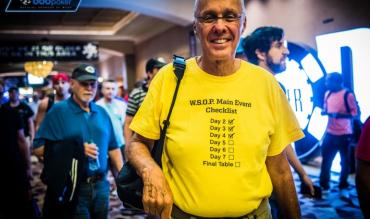The World Series of Poker (WSOP) Main Event is the most celebrated event in poker. It’s the one tournament of the year that the professionals won’t miss, and the non-professionals scrape a pen through its place on the bucket list.
The 42-winners since the event debuted in 1970 have a few things in common.
Skill. Luck. Endurance.
With the 2019 WSOP Main Event beginning on Wednesday, July 3rd, and ending on Tuesday, July 16th, you can safely say it’s more migratory bird than rabbit.
From 2008 to 2016, WSOP organisers included breathing space for those that made the final table, by introducing the November Nine concept allowing players to recuperate after the long slog. You would think this was good news for the older players, because anatomically speaking, the kids are mentally and physically stronger than their more experienced brethren.
But is this the case?
Let’s find out.
Table Of Contents
The Surge of the Young Guns
For the first eleven years, the average age of the WSOP Main Event Final Table was 47. In the previous eleven years, the average age has dropped to 32. For the first seven years, the only player to compete in the WSOP Main Event in their 30s was Crandell Addington. It took seven years for a man in his 20s to make the cut when Gary Berland lost to Doyle Brunson in the heads-up phase of the 1977 Main Event at the age of 27.
Back in the 70s, the average attendance of the WSOP Main Event was 15 players, so the event was over and done in a day. Things changed dramatically in 2004, the year after Chris Moneymaker won the Main Event, with 2,576 entrants turning up looking for the chance to get lucky. And it wasn't hyperbole - Moneymaker had turned fantasy into reality.
From this point forth, the WSOP Main Event would never be the same again. Each year officials were met with a new problem as thousands more turned up looking for a game, peaking in 2006 with the WSOP forging the $12m champion, Jamie Gold, out of 8,773 players.
The year Gold won the Main Event the average age of the final table was a mere 33 years old, but it got even younger when in 2008 the WSOP decided to change the format and create the November Nine. After that point, until 2016, the average age of the winner was just 23 years old.
So, what had changed?
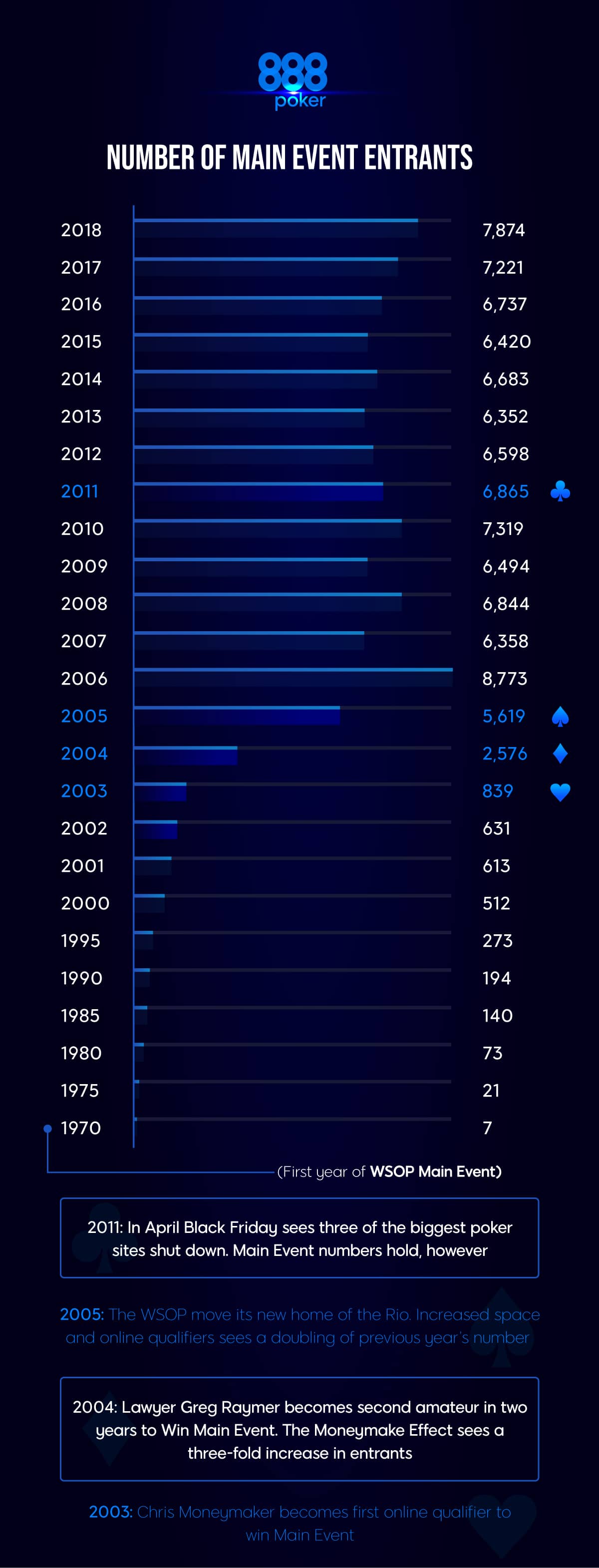
Revisiting the November Nine
In 2008, the WSOP decided to stop the WSOP Main Event once the final nine had been confirmed and then play the final table in November. The new format became known as the WSOP November Nine.
As soon as the WSOP introduced the new concept, Peter Eastgate, 22, became the youngest ever winner of the WSOP Main Event, a record Phil Hellmuth had held for close to two decades.
The following year, a 21-year-old Joe Cada beat the record. The next six champions were also their twenties, with Martin Jacobson (27) the only player older than 24.
Were the youngsters coming out on top more frequently because they had more time to prepare for the final? It certainly seems plausible to imagine a young twenty-something gathering the greatest minds in poker and spending the back end of the summer breaking down the play to develop a winning strategy.
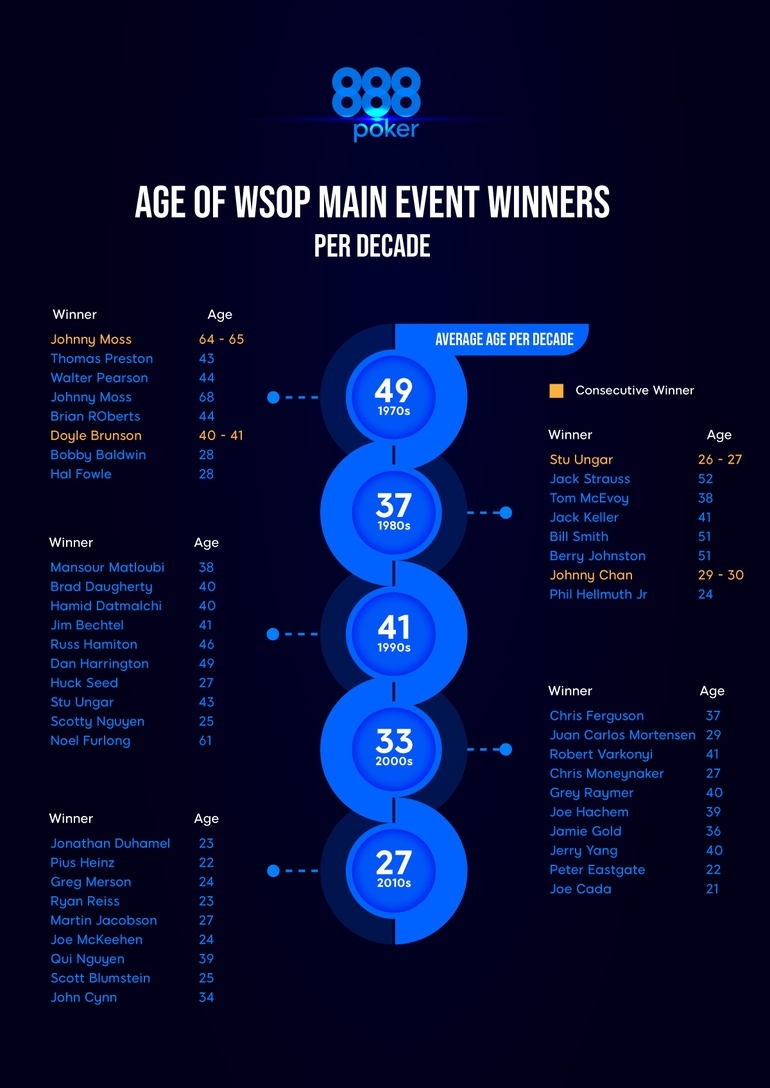
The November Nine Winners Have Their Say
Greg Merson won the WSOP Main Event in 2012. He was 24-years-old. Today, Merson's total live tournament earnings stand at $11.4m, and he has won two WSOP bracelets.
"I was lucky enough to have swapped with friends who I consider to be great tournament players, so I didn't hire a coach. But it was certainly nice to have them with me at the Final Table," said Merson. "I didn't want to do a lot of homework, other than studying the footage because I didn't want to alter what got me there. I was in such a heater at the time; I didn't want too many player's ideas in my head.
"Looking back on it, I regret not doing some ICM work. That being said, I don't think ICM takes certain things into consideration in this spot (added equity of winning), so I was glad that I was there to win and not try and scale the pay jumps.
"I do think that the break was a massive advantage for pros who will do all the right things to study vs. an amateur who may not even know where to start. Things have changed a lot the past five years, and I definitely would have studied way more in this environment than I did in 2012."
Only two players have won $10m+ in the WSOP Main Event: Jamie Gold in 2006 ($12m) and Martin Jacobson in 2014 ($10m). Jacobson was 27 when he won his title and, at the time, was one of the best live tournament players in the world. Jacobson featured in a documentary called 10 for 10 where it was evident the Swede benefited from advanced planning during the break.
“I like the idea of having a live broadcast rather than airing it months later, but I am sad to see the November Nine concept go," said Jacobson. "One of my personal highlights of making the final table was the anticipation and planning of it. It also gave friends and family enough time to plan a trip out to Vegas and be a big part of it, something I found invaluable."
One person who doesn't agree with the theory that younger players are more likely to take advantage of the pause in play is the youngest-ever WSOP Main Event Champion, Joe Cada.
“I don't think the November Nine concept had anything to do with all the youngsters making the final table,” said Cada. “I contribute it to the explosion of online poker after Chris Moneymaker won.
"I think the younger adults/teens transference to the virtual felt was generational. I was always big into video games and travelling for video game tournaments at an early age. Once the poker boom hit, it was almost like another video game, but the way of keeping score was $$.
"The online poker sites ran countless satellites for players to make their way to the WSOP Main Event. It allowed people to build their bankrolls a lot easier than grinding at a casino. The majority of this online poker boom was younger adults rather than your old school players.
"With online dying down due to our laws here in the United States, I feel that number is going to flatten out more. There will still be a lot of players from that generation, but now they will be hitting their thirties.
"Don't get me wrong, poker is always trendy for younger adults, but the online boom is well behind us. Until online poker comes back to the States, I feel like it's going to be rarer to see 21-year-olds, unless they're from other countries."
Neil Blumenfield was 61 when he made the final table in 2015 finishing third winning $3.4m, and he agrees with Cada that the introduction of the November Nine has nothing to do with the increase in winners in their 20s.
"They are winning more in the Nov Nine era because more of them make the final table. Anyone regardless of age, who didn't use the three months to work on their game made a horrible mistake," said Blumenfield.
"I am convinced that the Main Event is dominated by young players not because they have more stamina than older players, but just because they are at a time of their lives when they can, and choose, to work harder, avoid distractions and be more prepared when they sit down to play."
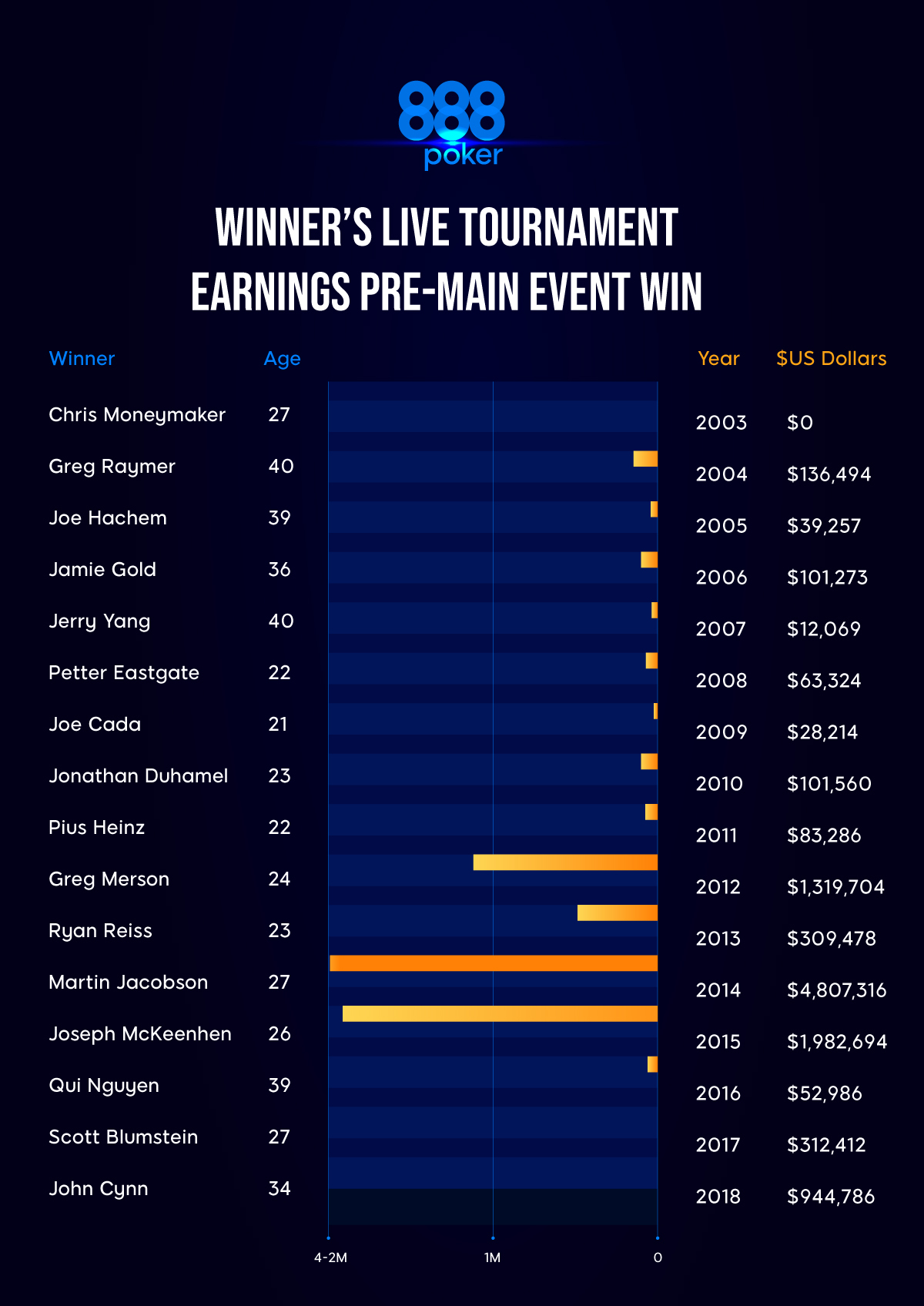
What the Professionals Say
Dr Stephen Simpson is a world-renowned mind coach, author of Poker Genius: The Mind Secrets of the Champions, and personal coach of some of the world’s best poker players including 888Poker Ambassador. He believes the key lies in mindset.
“At first sight, this is a stunning statistic and will give some of the older players more than a little discomfort. Tic Toc. However, poker players have a good handle on statistics and will ask the question, "Is this just random variance, or a statistically significant result?" A detailed analysis would be required to answer this question.
"I have had similar discussions with several of my clients, and my view has always been that meta-knowledge gained from playing and reviewing thousands of previous hands is their most valuable asset. Having said that, young people, in general, will learn new skills faster than the older generation. So, the acceleration in their knowledge is a steeper curve than in an older player. It will need to be to get anywhere near the battle-hardened experience of the veteran who has been there, done it, and has a lot of T-shirts in the drawer to prove it.
“Irrespective of age a player’s mindset is of more interest to me. How do they deal with the past? Do they remember all the hands they won, or punish themselves for all the hands they have lost? Are they clogging their mental bandwidth by worrying about all the things that may or may not happen in the future? Or are they able to focus all their concentration in the moment, knowing that is about all they can control.”
The Magic of the Internet
When Chris Moneymaker won the WSOP Main Event in 2003, he beat a record 839 entrants to take the $2.5m first prize. Moneymaker was a dream come true for poker, not only because of his surname but because he qualified for the event playing in an online satellite for $86.
The following year, inspired by the rags to riches tale of the accountant from Atlanta, Georgia, 2,576 players entered, with frightened poker players emerging from the back of darkened caves via online poker satellites. The numbers peaked at 8,773 in 2006 before the Unlawful Internet Gaming Enforcement Act (UIGEA) saw most of the big online poker rooms leave the US.
By the time of the UIGEA, word had spread, and the WSOP Main Event had become one of the most iconic sporting events in the world, with people travelling from all over the globe to take a shot at becoming a multi-millionaire.
Currently, online poker is only legal in four US states, and still, the WSOP Main Event numbers exceed 6,000+ every year. Cada's point is a strong one in as much as the twenty-somethings who came through the boom are still hanging in there. But sometime in the future this will plateau, because without online poker in the States you won't see a re-emergence of the kids.
You don't need to be a Space X employee to deduce that socially it's a lot more comfortable for a younger man or woman to play online poker than to wade into a game in a casino.
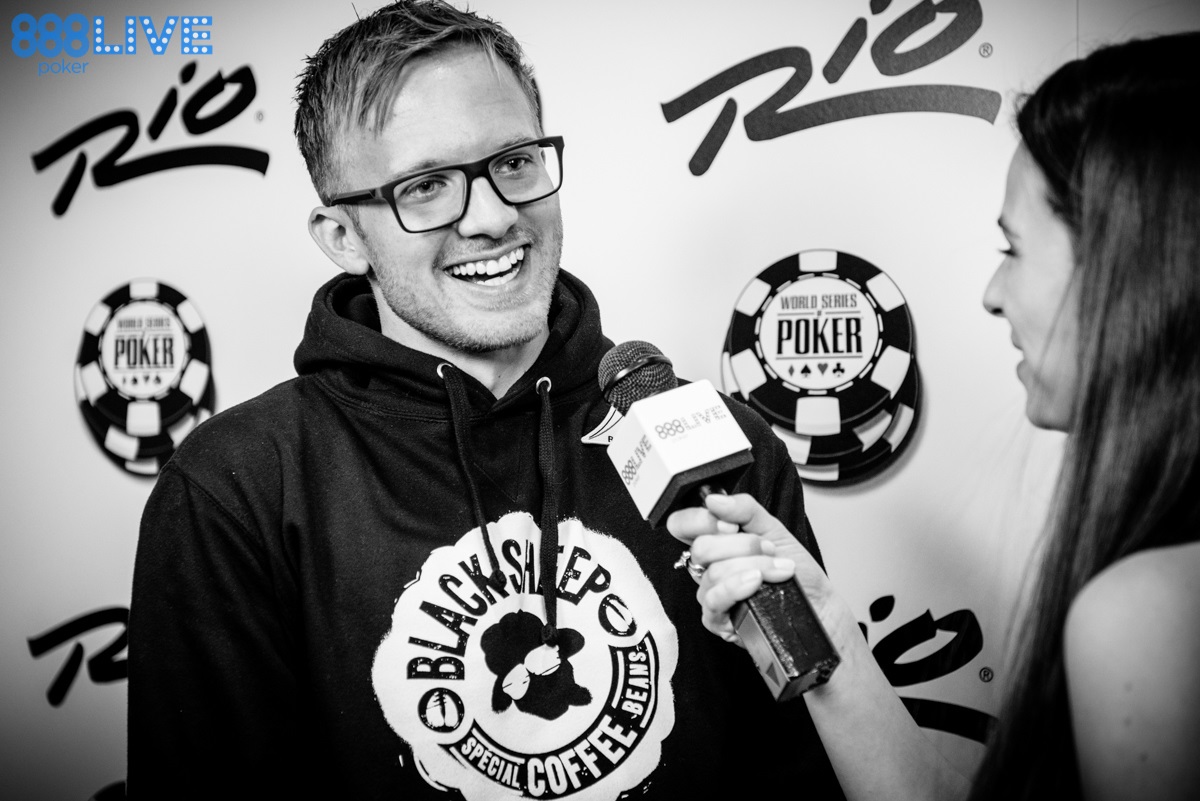
The Age Debate
Ryan Giggs played 672 times for Manchester United, scoring 114 goals. Giggs retired from top flight football aged 41, almost unheard of for an outfield player. Giggs was able to extend his playing career by using his experience to adapt to different roles within the team and conserve energy.
Poker is different.
Players don't only gain experience as they age, it happens due to the number of hands they play. The Internet allowed players to amass more hands than the likes of Doyle Brunson.
While this fact, doesn't negate the other added qualities of experience such as emotional intelligence, control, and reading social situations, the older you get, the more difficult it is to last a 10-day slog.
Our brains don’t start ageing until we hit our late twenties, meaning from 2008 to 2015, Joe Cada, Peter Eastgate and co still had a full set of healthy neurons.
From 30 onwards, we start losing our neurons as the myelin sheath, responsible for learning, starts to degrade. By the time we hit 60, our brain starts shrinking. In a study published in the British Medical Journal: reasoning skills in a group of people aged 45-49 had decreased by 3.6% over a decade.
And yet, when you talk to older players and give them a choice to play in the skin of the younger versus older models, they nearly always pick the older model, like Joe Cada, for example.
"The greatest thing about poker is there is something to learn each time you play, and every hand is unique," said Cada. "So, I would choose myself now, rather than the young man who won the WSOP Main Event eight years ago. You must adapt as a player because the game is always evolving."
During the WSOP Main Event Final Table of 2015, the average age rose to 36. It had not been that high since Raymond Rahme ballooned the 2007 median age to 39, competing at the final table aged 62.
Two men were responsible for the age hike in 2015.
One of them was Neil Blumenfield who finished third, aged 61, and he doesn't believe his game is deteriorating as he ages.
"My game gets better because I am playing more, working on the game more and have more time to work and play on poker as I no longer have a day job," said Blumenfield. "I also have a lot more friends who are elite poker players, so I talk more about the game which helps."
The other player is Pierre Neuville, who at 72 became only the second septuagenarian to make the final table of the WSOP Main Event after Johnny Moss did likewise in 1980 (73).
Patience, Patience and More Patience
Like Blumenfield, Neuville also believes he is getting better with age, and he has the results to back it up. In February, Neuville broke into the Global Poker Index (GPI) Top 50 after playing 150 tournaments, with a 25% ITM rate. As he heads to the WSOP, Neuville is on course to compete in 175 tournaments, and it would be good to recognise his accomplishments in the only way a poker player wants to be acknowledged, with a berth in the Poker Hall of Fame.
"I am proud to be the oldest player to make the November Nine," Neuville told me during the dinner break in the WSOPC event in Brussels. "I have been playing poker for 62-years, and my game is getting better as I enjoy it more.
"There are two secrets to success, the first is to have fun and the second is patience. The WSOP Main Event isn't a game for the youngsters; it's an event for the most patient.
"The fact is, old people, lose their patience as much as young people do. Being retired has nothing to do with it. I work a lot on my patience both on and off the tables with at least one hour a day reserved for meditation and various mental exercises."
Dr Stephen Simpson also points out the paramount importance of patience, while reminding both the young and the old of the valuable lessons they can glean from each other.
"Mature players by definition have demonstrated patience. Otherwise, they would have left the game a long time ago. A leading player told me last year he only had about five good hands throughout WSOP. If that is not a test of patience, I do not know what is! The younger players have yet to show this resilience. Some will have it, but many will not. One advantage [that] the kids may have, is that they are less likely to be haunted by the fear of previous failures.
"If I were a young player I would like to think about what I could learn from an older player. I would continue to play to my strengths but also spend some time developing these other skills. These older players have been doing something right.
"If I were an older player I would respect the enthusiasm and the joy that the kids bring to the table. I would envy them for the lack of emotional baggage they carry on their shoulders. I would take stock of my life and ditch all the negative rubbish too. The ideal player just might be in his or her 30s, and play with the passion and mental freedom of a player in their 20s.”
Age vs Wisdom vs Life
Neil Blumenfield once wrote a piece about the relevance of age during a WSOP Main Event run. While Blumenfield said he felt tired towards the end of Day 5, a sentiment echoed by Neuville, Blumenfeld believes the key is in the preparation, and I have to agree with him.
Younger players, unburdened by the need to live a balanced life, can focus 100% on their game, whereas older players are more likely to have a home, bills, marriages, and children.
It's for this reason that I still believe the November Nine concept allowed the younger players to flourish. It's not easy to change habits, and if you suddenly have to prepare for a poker game, and aren't used to that, then I don't think the output will be the same as the man I saw preparing in the 10 for 10 documentary.
Outside of the biology and the undeniable facts of science, I do believe the benefits obtained through wisdom will make up the stamina shortfall, especially if the older person exercises both the body and mind and eats well.
Neuville's view on patience is another key point, and it reminds me of the Young v Old Bull proverb where the young bull seeing a field full of cows says I am going to run down to that field and have sex with one of those cows. The old bull replies that he is going to walk down and have sex with them all.
I do see the average age of the WSOP Main Event finalists increasing in the next 5-10 years, not because of the shift away from the November Nine. Instead, I value Joe Cada's point that there isn't as much wiggle room for a teenager/twenty-something to get into the game, especially if they live in the US, which is where most of the WSOP Main Event players reside.
And by the time the US pulls its finger out of its deep, dark cave, our youngsters may not be interested in poker. Especially, with the rise in popularity of eSports. Who knows, maybe the WSOP story and dream of one day winning millions of dollars playing poker may be shelved for winning millions of dollars playing League of Legends?
